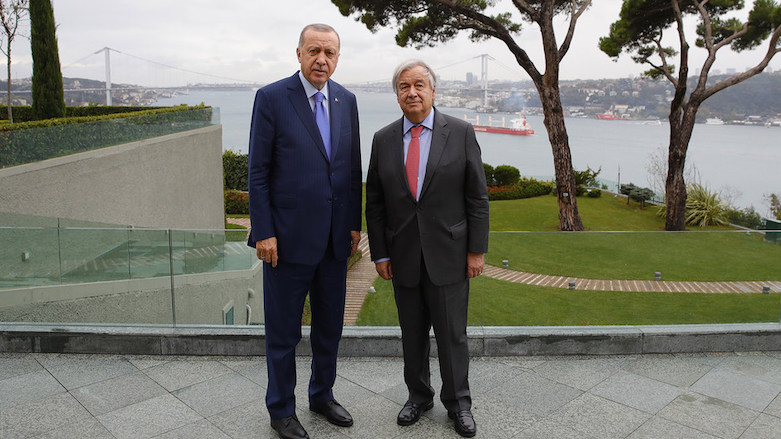Syrian Kurds slam UN chief for meeting with Turkey’s Erdogan

ERBIL (Kurdistan 24) – Syrian Kurdish officials say Turkey plans to implement demographic change in northern Syria following Turkish President Recep Tayyip Erdogan’s recent meeting with UN Secretary-General Antonio Guterres.
Erdogan met with the UN head on Friday to present a plan for the resettling of hundreds of thousands of Syrian refugees. According to Syrian Kurds, the project will change the ethnic demography of Syria’s northeast.
Luqman Ahmi, a spokesperson for the Kurdish-led self-administration for northeast Syria, told Kurdistan 24 that Turkey’s plan is similar to the demographic change in Afrin.
“We have seen Turkey do the same in the Afrin region where over 250,000 people were displaced, and have been forced to leave their homes and properties,” Ahmi said.
According to a June report by the Office of the United Nations High Commissioner for Human Rights (OHCHR), there were concerns about demographic change after Turkey took over Afrin from Kurdish forces in March 2018.
According to Ahmi, Turkey wants to repeat the same project in the Tal Abyad and Serekaniye areas under its control.
“We know that more than 300,000 people have already been displaced from those two locations, they have been left without a place to stay, without food, and in the cold.”
During Erdogan’s meeting with Guterres, the Turkish president outlined his government’s plan to reportedly return up to two million of the roughly 3.6 million Syrian refugees currently staying in Turkey to northeast Syria.
The majority of these Syrians are not from northeastern Syria but areas in northwest Syria. The Kurds fear their return could significantly change the demography of Kurdish-inhabited towns on the Syrian-Turkish border.
Ahmi said Turkey used military force to displace people from their homelands, and now plans “to resettle other Syrians who were displaced, in various agreements between Russia and Turkey, from Ghouta, Homs, Zabadani, and Douma.”
“That will not be accepted, because it means a demographic change is taking place,” he added.
“If Turkey truly wants to help Syrian refugees, they must [be returned] to their hometown and villages.”
In Friday’s meeting, Guterres underlined the “basic principles relating to the voluntary, safe, and dignified return of refugees,” a UN statement read.
The UN Secretary-General informed Erdogan that the UN refugee agency (UNHCR) would “immediately form a team to study the proposal and engage in discussions with Turkish authorities, in line with its mandate.”
Ahmi said Syrian Kurds hope the UN rejects the project and becomes aware of Turkey’s ambitions.
“Otherwise, the UN will be complicit in the crime of demographic change which Turkey is committing,” he told Kurdistan 24.
“We hope the UN will be responsible to preserve international law that calls for the protection of peoples.”
Meanwhile, Nicholas A. Heras, a Middle East security analyst at the Washington-based Center for a New American Security, said the UN chief is “playing with fire.”
“Guterres has to pay to lip service to Erdogan’s ideas because Turkey is an influential nation,” Heras told Kurdistan 24.
“Erdogan wants to rewrite the rules of international law regarding the rights of refugees so that Turkey can forcibly settle them into Syria,” he added. “If that was allowed to happen, it would set a devastating global precedent.”
Editing by Karzan Sulaivany
